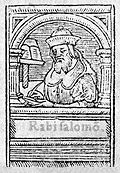

Rishonim (Hebrew: [ʁiʃoˈnim]; Hebrew: ראשונים, lit. 'the first ones'; sing. ראשון, Rishon) were the leading rabbis and poskim who lived approximately during the 11th to 15th centuries, in the era before the writing of the Shulchan Aruch (שׁוּלחָן עָרוּך, "Set Table", a common printed code of Jewish law, 1563 CE) and following the Geonim (589–1038 CE). Rabbinic scholars subsequent to the Shulchan Aruch are generally known as acharonim ("the latter ones").
The distinction between the Rishonim and the Geonim is meaningful historically; in halakha (Jewish law) the distinction is less important. According to a widely held view in Orthodox Judaism, the Acharonim generally cannot dispute the rulings of rabbis of previous eras unless they find support from other rabbis in previous eras. On the other hand, this view is not formally a part of halakha itself, and according to some rabbis is a violation of the halakhic system.[1]InThe Principles of Jewish Law, Orthodox rabbi Menachem Elon writes that:
[such a view] "inherently violates the precept of Hilkheta Ke-Vatra'ei, that is, the law is according to the later scholars. This rule dates from the Geonic period. It laid down that until the time of Rabbis Abbaye and Rava (4th century) the halakha was to be decided according to the views of the earlier scholars, but from that time onward, the halakhic opinions of post-talmudic scholars would prevail over the contrary opinions of a previous generation.[2]
 |




